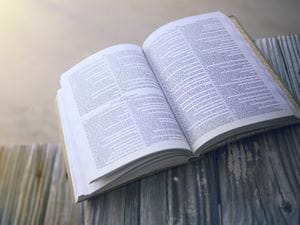
The book of Psalms is the songbook of ancient Israel, and it stands today as a collection of poetry meant to inspire God’s people to worship. Meditating on the words that have been preserved for us, we are reminded of God’s incredible faithfulness and our great need of a Savior. If we dwell on them long enough, we can be lifted up into the throne room of heaven to bend low in awe of our King.
The book of Psalms is indeed an invitation to worship, but it’s also a reservoir of raw emotion. David and the other psalmists never put a phony, positive spin on their struggles, nor did they attempt to hide their true feelings when life came at them with the force of a chariot. They let it all out, as though the words they penned were meant for God alone and would never meet the eyes of another human being.
This is where most people stop—that is, they recognize the Psalter is filled with worship and plenty of raw emotion. In that, the book is a comforter and an ally. But the book of Psalms is also a teacher. If we look closely, we’ll find lots of connecting points to the larger story of redemption. That’s what surprised me most about the book when I sat down to read it during the summer of 2020.
Like many people who open up the book of Psalms, I was looking to draw closer to God and to find words to express my fears and anxieties in prayer. But what I found were the fingerprints of the Holy Spirit on every page. It was as though He were beckoning me to read the Psalms in light of the other sixty-five books of the Bible—to step into the story God has been writing since the beginning of time, a story that leads to Jesus our King.
There are dozens of psalms that offer a majestic journey in the wilds of holy Scripture, but for now, here is a guided tour of three psalms that will draw you into the epic tale of God’s redemption.
Psalm 15: God’s Holy Mountain
In this reflective psalm, David asks, “LORD, who may dwell in your sacred tent? Who may live on your holy mountain?” (v. 1 NIV). He answers his own question immediately, saying, “The one whose walk is blameless, who does what is righteous” (v. 2). Though David is, of course, thinking of Mount Zion in Jerusalem where a tent housed the ark of the covenant, his Q & A invites us to look back to the beginning, back to Eden, where the first humans lived with God on His holy mountain. (See Ezekiel 28:13–14 for a description of Eden as “the holy mount of God.”)
We were created to live with God, to know Him and walk with Him in unbroken fellowship. But then Adam and Eve opened the door for sin to enter our world, and our ties to the Lord were severed. We were no longer permitted to live with God in paradise. That’s why David must ask the question.
David’s answer is also telling, for the New Testament reveals “the one whose walk is blameless, who does what is righteous” is—spoiler alert!—Jesus of Nazareth. No one else can walk up the mountain and enter into God’s presence on their own merit. No one else has perfectly reflected God’s heart. And the good news is this: when we come to Him in faith, He gives us His righteousness. You and I are invited to live with God once again, just as in Eden.
Psalm 34: Not One Bone Broken
With most of the psalms, we’re left to wonder the situation that prompted the psalmist’s heart cry to God. Not so with Psalm 34. The title of the psalm tells us “Of David. When he pretended to be insane before Abimelek, who drove him away, and he left.”
Here’s the scene, as recorded in 1 Samuel 21: A young David is on the run from King Saul. He figures that since Saul has men everywhere, there’s really no good place for him to hide within the borders of Israel. Therefore, he goes to Gath of the Philistines, the hometown of Goliath, whom he killed in a one-on-one showdown some years earlier.
When he’s been in town for a while, the people begin to figure out his identity, and David knows he’s in trouble. So, he pretends to be insane, banging on doors and frothing at the mouth. After all, there’s no honor in killing a mentally disturbed person. The plan works, and David escapes Gath unharmed.
Psalm 34 is a song of praise for God’s hand of protection over his life. But there’s a curious thing about the psalm. David writes, “The righteous person may have many troubles, but the LORD delivers him from them all; he protects all his bones, not one of them will be broken” (vv. 19–20). It’s an odd thing to say, isn’t it? If David had broken a toe on his way out of town, would God’s faithfulness have been diminished? Of course not. There’s something more at work in David’s choice of words.
An ancient Israelite reader would have connected the reference to no broken bones with the Passover lambs of Exodus 12. There, God commanded, “Do not break any of the bones” (v. 46). The blood of those spotless lambs was painted on the doorframes of the Hebrew homes to mark the people inside as belonging to God. The lambs died in their place, unblemished substitutes for sinful people. Their unbroken bones came to symbolize the righteousness that no Israelite could muster.
Jesus was the perfect Lamb of God, the righteous substitute that saves us from the judgment our sin deserves. And like the Passover lambs before Him, He was without a broken bone (see John 19:33, 36).
Through Psalm 34, the Holy Spirit is beckoning us to look back on Israel’s early history; then to the cross of Christ, where our salvation was wrought; and finally to our own future, when we will be welcomed into God’s presence as men and women without spot or blemish—righteous people without a single broken bone.
Psalm 55: Ancient Curses Turned to Blessings
David is not shy when it comes to expressing his emotions in prayer. Throughout the Psalms, he regularly pours out his heart before God, holding nothing back. Psalm 55 is no exception. Though we don’t know the particular enemies who are troubling David, we know they have him shaking in his sandals: “Fear and trembling have beset me; horror has overwhelmed me” (v. 5). Is it any wonder, then, that David calls down two of the most famous and ancient divine curses upon those who are threatening him?
First, he prays, “Lord, confuse the wicked, confound their words” (v. 9). This is a callback to Genesis 11:1–9 and the Tower of Babel incident. The people who had settled in Shinar started building a tower that would reach the heavens. This was more than ostentatious architecture; this was an attempt to return to God’s presence by building an artificial Eden. And God put a stop to it by confusing the language of the people. David knows his enemies will no longer be able to plot against him if they receive the same treatment.
Second, David petitions the Lord, “Let death take my enemies by surprise; let them go down alive to the realm of the dead” (v. 15). Again, the origin of this curse can be found in Israel’s history. In the wilderness, a man named Korah led a rebellion against Moses and Aaron, God’s chosen leaders for the newly formed nation of Israel. How did God respond? “The ground under them split apart and the earth opened its mouth and swallowed them and their households…. They went down alive into the realm of the dead” (Numbers 16:31–33). As the king of Israel, David is God’s chosen leader for His people. And so, David wants the Lord to give his enemies precisely what Moses’ adversaries received.
While you and I might read such a sentiment and be reminded of Jesus’ command to love our enemies (Matthew 5:44), it’s hard not to empathize with David’s emotions.
God, of course, is better than you or me or King David. God loves His enemies in ways we cannot fathom. He sent Jesus to die for sinners in rebellion against Him. And here’s the best part: His love undoes these very curses David invokes.Rather than humanity being forever divided by language and nationality, one day men and women “from every nation, tribe, people and language” will stand before God’s throne as one holy people (Revelation 7:9). And the earth will open up once again, as it did in Korah’s day, but this time it won’t swallow anyone alive; it will instead release from the grave those who have died in faith, to live with Jesus forever (Daniel 12:2; 1 Thessalonians 4:16). God really is that good—so good, in fact, that He turns curses into blessings.

